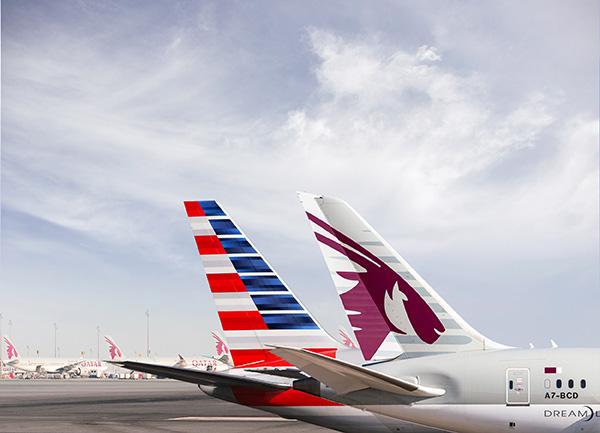
Considering the caustic relationship between the CEOs at American Airlines and Qatar Airways in recent years, the language in the two carriers’ announcements this week of their new “strategic partnership” is a remarkable about turn.
“We have moved on from past issues,” Qatar Airways Group CEO Akbar Al Baker said.
“The issues that led to the suspension of our partnership two years ago have been addressed,” concurred American chairman and CEO Doug Parker. Both men went on to laud the opportunities their newly restored relationship could bring their companies.
All this bonhomie supposedly sweeps away years of campaigning by American, which joined forces with Delta Air Lines and United Airlines to persuade employees, lawmakers and customers that Qatar Airways, Etihad Airways and Emirates Airline threatened their long-term growth. Parker ended American’s codeshare with Qatar, despite the two carriers being oneworld alliance partners, and publicly rejected an attempt by Al Baker to purchase a stake in American.
Al Baker hit back with stinging comments, describing the US majors as “crap American carriers,” making thinly veiled public criticisms of Parker, and threatening to take Qatar Airways out of oneworld.
But now they are pals. What brought about this rapprochement?
First, neither the Obama nor the Trump administrations were interested in getting actively involved on the US carriers’ dispute with the Gulf carriers. The Trump administration bluntly told the US airlines that if they had a justified complaint about alleged anti-competitive behavior and government subsidies, they should take those claims to the established governmental channels (they never have).
Second, and perhaps more important, American has been cornered by Delta, one of the very US majors it campaigned with against the Gulf carriers. Delta’s stunning September 2019 raid on LATAM, in which it took a 20% stake and brought an end to Dallas Fort Worth-based American’s longstanding and strategically important partnership, has weakened American’s South American network and will take LATAM out of oneworld.
Delta, not Qatar Airways, is American’s threat.
At the CAPA Qatar Aviation Aeropolitical and Regulatory Summit in Doha in February, Al Baker, whose company has a 10% stake in LATAM, was asked how he would co-exist with Delta.
“I am ready to do business with the devil,” said Al Baker, in what may now be seen with hindsight as a highly significant statement. “People will ask, ‘Why are you doing business with Delta?’ I will shake hands with anyone and do business with anyone if it is in the interests of my airline and my company.”
And Qatar Airways, like American, is also in need of friends. The diplomatic dispute with three neighboring states of Saudi Arabia, the UAE and Bahrain (plus Egypt) shows no sign of resolution after more than two years, and the costs have been considerable for the Doha-based airline.
A look at the map shows that avoiding the airspace of the surrounding countries means all Qatar Airways’ flights must head east across the Gulf and into Iranian airspace before turning on to headings for their destinations.
This adds around 25 minutes’ flying time to all of Qatar’s flights and the additional cost involved was a major factor in its $639 million net loss last year.
What might American get out of this new deal? It does not fly from the US to Qatar, but there has been speculation in some quarters that Alaska Airlines, which is scheduled to join oneworld in 2021, could act as a feeder for American on a Seattle-Doha route.
The talks between American and Qatar have apparently been ongoing since at least the fall of 2019. That would pre-date the demise of Air Italy, in which Qatar had a 49% stake and which the US majors also targeted, painting it as a Trojan horse for Qatar because of its flights between Italy and the US. The disappearance of Air Italy, while not a critical factor in the new relationship between the two majors, has certainly removed a source of irritation.
International Airline Group CEO Willie Walsh was asked about the Qatar-American spat at an investors’ meeting in November last year. Walsh and Al Baker have a close business relationship (Qatar is a 25.1% shareholder in IAG) and the two men get on well. Asked how Qatar and American would co-exist as joint shareholders in LATAM, Walsh reportedly replied, “I would expect to see a very different attitude from American towards Qatar as a result of that.”
Walsh’s prediction was right on the money.
Alan Dron/ATW [email protected]



